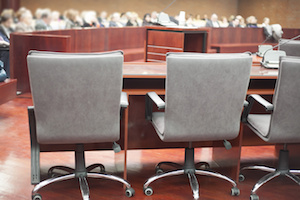Dallas Buyers Club LLC, the company behind the Oscar winning film starring Matthew McConaughey and Jared Leto, has actively pursued individuals who illegally downloaded the movie on a bit-torrent stream both domestically and abroad. The company has filed more than 3,500 subpoenas across the United States demanding anonymous users come forward with personal information, and this week litigation in front of an Australian federal court progressed with DBC’s hiring of a technology expert witness who will help the company identify parties who illegally download the film.
Dallas Buyers Club LLC Seeks Illegal Downloaders
While Dallas Buyers Club LLC has sent subpoenas demanding personal information to suspected illegal downloaders here in the United States, the company has taken more advanced steps in Australia. In a highly publicized legal action, DBC has taken Australian Internet Service Providers (ISPs), including Australia’s primary ISP iiNet, to task for failing to reveal the identities of users who downloaded the movie illegally. iiNet refused DBC’s request to reveal personal customer data, leading to a lawsuit in the Federal Court of Australia in which DBC asks the court to grant a “preliminary discovery” to compel identification of people who committed copyright infringement by downloading the film from illegal stream torrents.
While iiNet acknowledged that DBC had the right to pursue infringement of a copyright, the company questioned whether or not DBC would use customer information responsibility. Steve Dalby, an iiNet executive, responded to DBC’s claim by saying, “In this case, we have serious concerns about Dallas Buyers Club’s intentions. We are concerned that our customers will be unfairly targeted to settle any claims out of court using a practice called ‘speculative invoicing.’ iiNet is concerned that such a development would open the floodgates to further claims by other rights holders, leading to more Australians being intimidated to pay exorbitant amounts in an attempt to avoid improbable litigation.”
Dallas Buyers Club Hires German IT Expert Witness to Track Illegal Downloads
Contributing to iiNet’s concerns was DBC’s use of a German organization hired to connect IP addresses to personal user information – a process that iiNet and other ISPs felt uncomfortable with. To investigate the organization further, iiNet requested an expert witness from Germany to explain how the company tracks individual users in order to assess the reliability and accuracy of the procedure.
After failing to receive personal information about illegal downloaders from ISPs upon request, Dallas Buyers Club LLC hired German company Maverickeye UG to track Australian users based on IP addresses that accessed the Oscar-winning film online. According to the company’s website, Maverickeye uses “highly sophisticated software” and “robust hardware infrastructure” to obtain accurate user information identifying users who committed acts of copyright infringement.
To explain the process of reverse tracking users through IP addresses, DBC asked for an expert witness report from Dr. Simone Richter, a German IT professional who has experience in piracy detection systems like Maverickeye. As explained in Richter’s report, Maverickeye serves a sort of lure to potential copyright infringers by acting as a source of data without actually transferring anything. Once the system identifies a willing exchange partner, the IP address is identified and connected to illegal downloading activity. According to Dr. Richter, Maverickeye is able to distinguish IP addresses of users who are willing to distribute a piece of copyrighted data from users who simply share files online with others.
For the purposes of Dallas Buyers Club LLC’s lawsuit, Maverickeye was tasked with identifying user account information connected to IP addresses that illegally accessed the movie online.
Australian Internet Provider Requests Expert Witness
Given the concerns that DBC would misuse user information, iiNet and other Australian ISP’s were reluctant to accept the film owner’s use of Maverickeye without first testing the reliability and accuracy of the user information obtained. Arguing that the potential consequences to users that Maverickeye identified required a full analysis of the process, iiNet asked Justice Nye Perram for in-person access to Dr. Richter so he could explain his report.
In order to substantiate Maverickeye’s ability to present user data that accurately matched an IP address to an individual account holder AND connect that particular individual to the act of copyright infringement, iiNet requested DBC fly Dr. Ricter from Germany to fully explain how Maverickeye operated. Citing expense, DBC’s lead attorney attempted to satisfy iiNet and the Australian federal judge by reading from Ricther’s expert witness report which explains the process of identifying users based on IPs, but iiNet responded that due to the complexities of the issue the witness needed to be cross-examined. Attorneys for iiNet argued that because account holders who were identified by Maverickeye would face the threat of legal action from DBC, the process needed to be fully vetted by having the expert witness testify in person during trial.
Ultimately Judge Perram agreed with iiNet, and ordered DBC to fly Dr. Richter to Australia so his expert testimony could be heard in person. The question of whether DBC can force ISPs like iiNet to reveal user information will proceed in January, and given the development of a similar issue in the US, how Australia uses Dr. Richter’s expert witness testimony could become important in future litigation domestically.












